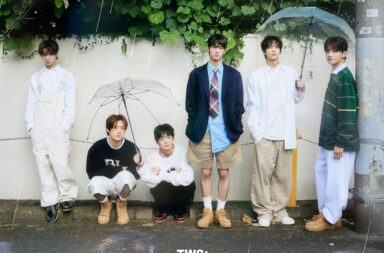While the first episodes of 2017 are still revealing themselves to us, we at Seoulbeats have taking our time bidding 2016 adieu with our 2016 End-of-Year reviews. This time around, Lo and Willis discuss their favorite dramas of the year and stir some drama of their own over one particular drama.
| Lo | Willis | |
| 1 | Signal | Signal |
| 2 | Age of Youth | Police Unit 38 |
| 3 | Dramaworld | The Good Wife |
| 4 | Descendants of the Sun | Descendants of the Sun |
| 5 | Jealousy Incarnate | Reply 1988 |
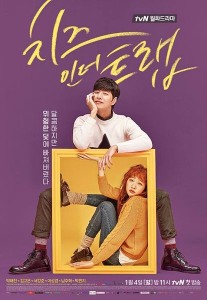 Willis: I started this year with a mission to watch more dramas than I have previously, and I found dramas in the first half of the year to be more rewarding than the latter half. There were some high profile dramas this year that I left off my list even though they had me hooked with their first few episodes. Cheese in the Trap had me for 75% of the drama with their intriguing characters but lost me with the messy ending. This could also apply for W and Another Oh Hae-young which seemed to drag on for a few episodes too long.
Willis: I started this year with a mission to watch more dramas than I have previously, and I found dramas in the first half of the year to be more rewarding than the latter half. There were some high profile dramas this year that I left off my list even though they had me hooked with their first few episodes. Cheese in the Trap had me for 75% of the drama with their intriguing characters but lost me with the messy ending. This could also apply for W and Another Oh Hae-young which seemed to drag on for a few episodes too long.
To speak on my list, I love dramas that delve into the many layers of their characters and explores the complexity of their relationships with others. Usually, these dramas will have some overarching socio-political themes that drive the plot and anchors the motivations of multiple characters, adding some dynamics to the standard story structure. What about you, Lo?
Lo: For me, television is my passion — I want to write TV someday — and my love of dramas is firmly rooted in how different the experience of Korean versus American TV truly is. 7 years ago, this meant I used K-dramas to fill the romance void in the American market. Now, it’s all about how shows are constructed. Korean TV shows are limited run in comparison to American — they have a set end, rather than being designed to run for years, and that results in vastly different types of shows. Socio-political K-dramas? I tend to pass, because, by and large, those are stories better told with time. There are exceptions, but as a whole, it doesn’t talk to me. I gravitate more towards romances, coming-of-age stories, and comedies, because the set ending works in the favor of the structure.
Of course, character is key. My favorite dramas are ones where the real enemy is the conflict between different types of people. Set villains are dull, but when your “bad guy” is miscommunication, uncertainty, and projection of false values, you have way more options.
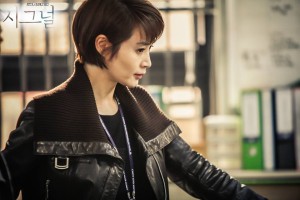 However, theory is boring, especially when we have solid examples in front of us. I say we start of with the two we have in common– at the exact same slots, even!– Signal and Descendants of the Sun. Given what we’ve both said, Signal makes sense on yours, DotS on mine, but the cross-listing is what makes it interesting, and speaks to the power of these dramas.
However, theory is boring, especially when we have solid examples in front of us. I say we start of with the two we have in common– at the exact same slots, even!– Signal and Descendants of the Sun. Given what we’ve both said, Signal makes sense on yours, DotS on mine, but the cross-listing is what makes it interesting, and speaks to the power of these dramas.
Signal is my top choice because… it just is the best drama of 2016. The acting is incredible, the topic is timely but not dated, the acting magnificent, and it just looks so good; the camera crew totally needs more love. Yet what pulled me in was the incredible writing. Time travel is a nightmare to write about in the best of conditions, but Signal has the hardest possible time-travel scenario to write: time is linear from Jae-han’s (Jo Jin-woong) perspective, but shifting in a butterfly effect from Hae-young’s (Lee Je-hoon), all wrapped up in a closed time loop a la Doctor Who‘s “Blink”. You should need a flow chart in order to track events in this series where the basic fact “things that happen after other things happen after other things” no longer holds true, but you don’t. It shouldn’t be easy to track, but it is.
The characters are even more excellently handled, particularly Soo-hyun (Kim Hye-soo). She is the only character who has to exist in the present and past simultaneously, becoming the person we are already seeing her as. Neither her relationship with Jae-han or Hae-young is diminished, with both given equal weight, and making it unclear who is the first male lead and who is the second.
Willis: I am completely aligned with you about Signal. It’s just incredibly put together. Time travel often gets tripped up by its rules, but Signal makes it work. Part of that involves the premise of reaching back in time to prevent or solve crimes and murders. Overcoming the outdated statute of limitations and really getting to this anxiety of feeling powerless against time and the law makes for some powerful weight in this drama. Soo-hyun was definitely the anchor of the drama. Perhaps what I loved about her character was how real she felt. She was fully realized character who had this indomitable desire for justice while having to overcome some really tough situations. This drama was everything in 2016.
Descendants of the Sun was a drama that I debated including on my list. It had a little bit of everything — romance, comedy, and action, but also so many plot holes — and the second half was over the top. However, even I couldn’t ignore its immense success and for parts of the drama, I can see why people loved this show. You want to root for these characters. Mo-yeon (Song Hye-kyo) grows to have this caring and compassionate side to her and Shi-jin (Song Joong-ki) is the golden child who aims to do right by those he cares for. They both live in the extremes, between life and death, in their everyday occupations, and you just want to see them be happy.
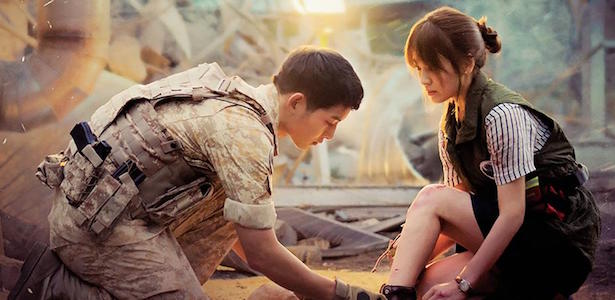 Lo: Amen to everything you said about Descendants. It’s flawed, melodramatic, and full of cop-outs the audience could see coming a mile away, but it was such a phenomenon that leaving it off the list seemed not only unfair, but inaccurate; like it was such a cultural force that not including it would have given off totally wrong ideas about dramas in 2016. But, more to the point, I liked it. A lot. It connected to emotion, both characters and the audiences, in a way that made everything feel real. The conflict that kept Mo-yeon and Shi-jin was much more interesting than typical romances, because it stemmed from a direct clash in their worldviews, to the extent that without Urk, they would never have gotten together. It was even compelling enough to keep my mother interested, which has happened exactly once before.
Lo: Amen to everything you said about Descendants. It’s flawed, melodramatic, and full of cop-outs the audience could see coming a mile away, but it was such a phenomenon that leaving it off the list seemed not only unfair, but inaccurate; like it was such a cultural force that not including it would have given off totally wrong ideas about dramas in 2016. But, more to the point, I liked it. A lot. It connected to emotion, both characters and the audiences, in a way that made everything feel real. The conflict that kept Mo-yeon and Shi-jin was much more interesting than typical romances, because it stemmed from a direct clash in their worldviews, to the extent that without Urk, they would never have gotten together. It was even compelling enough to keep my mother interested, which has happened exactly once before.
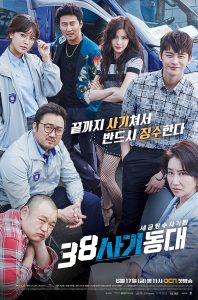 Willis: Now looking at the other dramas I chose, I wouldn’t call them outright socio-political dramas, but the undercurrents of unrest with the systems in place and status quo are what pique my interest.
Willis: Now looking at the other dramas I chose, I wouldn’t call them outright socio-political dramas, but the undercurrents of unrest with the systems in place and status quo are what pique my interest.
Police Unit 38 plays with this unease with the tax system and the 1%. Jung-do (Seo In-guk) plays the professional swindler out to get back at the people who wronged him. Sung-il (Ma Dong-suk) is a manager at the tax collection bureau. It’s a drama that sees Sung-il join the swindlers’ side to get back at the 1% and the corrupt bureaucrats who cheat the system and deny their civic duty. All in all, it’s a thriller of a show. In order to collect what’s due, these two create the titular task force. The story goes through multiple schemes, plot twists, and complex get-ups, and overall it’s a great show that has you cheering for justice enacted for those who think they’re above the law, no matter the shape or form.
The Good Wife on the other hand is a bit of an anomaly because it is an adaptation of the US series, and it stays true to the source material for the most part. This drama ended up on my list because of the strength of the acting. Nana, Yoo Ji-tae, and Jun Do-yeon all put in strong performances that gave their characters a slightly different feel from the ones in the US series. I especially found Do-yeon and Ji-tae’s rapport to be some of the best interactions on screen. Ji-tae brings this slightly sinister gaze and emanates quiet power as Tae-joon. Do-yeon plays Hye-kyung as someone with an indomitable will and with a quiet ambition. The drama didn’t have many, if any, plot holes and the solid adaptation and great performances from the actors allowed it to shine.
Alright Lo, I’m curious about the other dramas on your list. I’ve heard of both Age of Youth and Jealousy Incarnate but haven’t seen an episode of either. What are those stories about and what made them stand out for you this year?
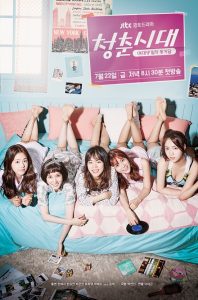 Lo: Age of Youth is a drama that I enjoyed, but more than that, I respect. It’s a coming of age story… about women. This doesn’t sound like a huge deal, but remember: women are almost always seen as an “other” in writing. Female characters are rarely written as well as males, because “female” is often viewed as a defining character trait. To see a cast of women, spanning a wide variety of personalities and goals, all of whom are treated with respect by the camera and series… I have to love it on that alone. But it’s more than cold respect I feel for Age of Youth, it’s warm fuzzies, too. This show just made me smile the whole way through, and most shows can manage one or the other, but Age of Youth does both. It’s almost reminiscent of Sex and the City or I Need Romance in that the primary focus is on female friendship rather than romance, only the development of those bonds rather than maintenance. I firmly recommend it.
Lo: Age of Youth is a drama that I enjoyed, but more than that, I respect. It’s a coming of age story… about women. This doesn’t sound like a huge deal, but remember: women are almost always seen as an “other” in writing. Female characters are rarely written as well as males, because “female” is often viewed as a defining character trait. To see a cast of women, spanning a wide variety of personalities and goals, all of whom are treated with respect by the camera and series… I have to love it on that alone. But it’s more than cold respect I feel for Age of Youth, it’s warm fuzzies, too. This show just made me smile the whole way through, and most shows can manage one or the other, but Age of Youth does both. It’s almost reminiscent of Sex and the City or I Need Romance in that the primary focus is on female friendship rather than romance, only the development of those bonds rather than maintenance. I firmly recommend it.
Jealousy Incarnate… I waffled so hard on this one. On the one hand, easily the best rom-com of the year. On the other, flaws. The characters are stereotypical, Na-ri (Gong Hyo-jin) can get really grating with her total lack of self-worth, and the second lead syndrome is so, so real. But it won me over by being unorthodox. So much of this drama works by setting up the joke, making the joke, making the joke again, and then bringing the joke right into tragedy. Na-ri repeatedly groping Hwa-shin (Jo Jung-suk)? Funny. Na-ri explaining it’s because she felt a lump that might be cancerous? Mood whiplash right into tragic, with a stronger pull on the audience due to our guilt at laughing in the first place. This set-up happens over and over again, but it works because you don’t know which joke will suddenly turn dark. Furthermore, there are a lot of things here that I have always wanted to see in dramas — my personal favorite is Ja-young (Park Ji-young) responding to the break-up envelope of money with flattery that she got one at her age and then deciding to spend it all on dates. And honestly, I like the message given by having Na-ri date Jung-won yet falling for Hwa-shin anyway: you can’t pick who you love. Sometimes, you just love the asshole over Prince Charming, and no amount of “he’s so sweet” can make that spark appear.
But onto the elephants on the lists, about which I have one question: Reply 1988. What the hell?
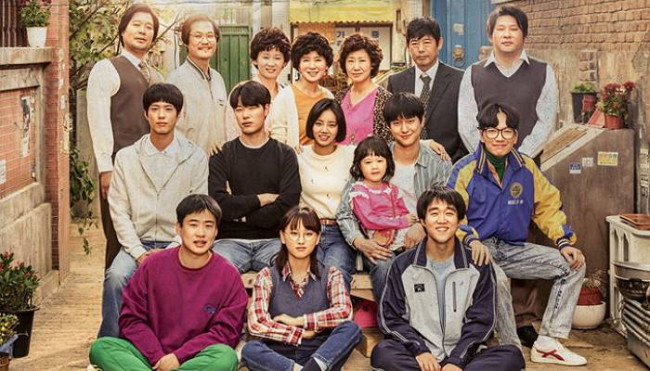 Willis: Lo — I knew I was going to have to fight you when I put Reply 1988 on my list.
Willis: Lo — I knew I was going to have to fight you when I put Reply 1988 on my list.
Honestly, I am just a sucker for the Reply series. Like Descendants of the Sun, Reply 1988 was a phenomenon, and I was here for it. What I love about the Reply series is how they capture an era. The writers and production team do their research, and the story is steeped in realism. The story doesn’t live on the fringes or aim to paint this fantastical, romantic story, but instead takes great care in fleshing out the daily lives of the families focused on within the story and finds the fantastic in the resilience of the characters as they grow older together. The family-focused drama has this wonderful warmth to it, and I usually end up feeling touched by certain storylines. Sure, Reply 1988, like the other iterations in the Reply series, includes the tired plot device of “guess who is the husband” and sure, the ending is a bit messy, but I’m willing to forgive those things because of how wonderfully detailed and beautifully crafted the drama was.
Lo: ” A bit messy”? “A BIT MESSY”!?!? The ending of Reply 1988 is not “a bit messy”, it’s a goddamn tsunami wreaking havoc on an otherwise amazing show. You’re absolutely right about everything else; this is a phenomenal drama that has created a world far beyond most television. It’s intricate and genuine, and had it not been for that ending, Reply 1988 likely would have topped my list.
But that ending is there, and the thing that really pisses me off isn’t that my ship lost — that’s what fanfic and headcanons are for, people — but that it was so sloppily written and so disrespectful of the ensemble and closeness you were praising. Half the gang doesn’t appear in the last episode! Major characters are left with no resolution! It turned from a heartwarming piece about the interweaving of neighborhoods into a melo, and the melo was crap. People will watch shows even if they know how it ends. We all know the lead couple in a romance will get together, it’s the how we’re interested in. But Reply 1988 decided that a twist whose set-up makes no sense was better than a ending we all saw coming but enjoyed watching anyway. And I refuse to reward that ass-backwards mindset, because if we let it go, they will keep doing it. Anybody want that? Anyone? Anyone at all?
Didn’t think so.
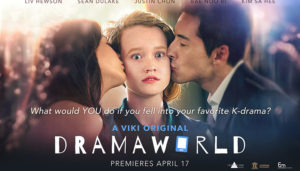 Of course, I have my own “what the hell?” entry, Dramaworld. There is no doubt that many will claim this doesn’t qualify as a K-drama… and they’re partially right. It’s not a K-drama, not completely. But neither is it an American series. The plot, the structure, the tropes, they all pull more from dramas than anything else. It’s a fusion web series, but given that web series have placed on our lists before, and that it favors the drama side of things, I decided to count it. And hey, it’s my list.
Of course, I have my own “what the hell?” entry, Dramaworld. There is no doubt that many will claim this doesn’t qualify as a K-drama… and they’re partially right. It’s not a K-drama, not completely. But neither is it an American series. The plot, the structure, the tropes, they all pull more from dramas than anything else. It’s a fusion web series, but given that web series have placed on our lists before, and that it favors the drama side of things, I decided to count it. And hey, it’s my list.
Originally, I was going to rank it lower, due to the “is it or isn’t it” question, but when I realized that meant placing it below Jealousy Incarnate and DotS, I couldn’t do it. The writing is just so strong, especially compared to my 4 and 5 slots. And it’s comedy, which makes more impressive. People give more respect to heavier, weightier pieces, like Signal or The Good Wife, but the saying “dying is easy, comedy is hard” applies to writing just as much as acting. Death and loss are always sad, but writing smart jokes that are broad enough to land AND be found funny by a majority of people is way harder. Dramaworld is clever enough to mock its audience outright, while still getting us to laugh and love… that’s no easy feat. The jokes are more than just jokes, but clever foreshadowing and hints of what’s to come.
I firmly believe the best set-up in any TV show anywhere this year is Claire’s dad’s “Korean Billionaire” quip — the set-up is funny by itself, the payoff is funny by itself, and on the 3rd watch, you realized the set-up and payoff are a sequence rather than two separate events, and it gets 10 times funnier. That’s not to say the other aspects of the show slack off. The cast is incredible, bringing depth and nuance to what are literally stereotypical roles, the camerawork is solid — especially with the knack for leaving hilarious background events juust in frame, so you don’t think anything of it until you see Siwon getting smacked by his intended love interest — and the music is brilliant. My only complaint is that there is no word on a season 2.
Willis: Did you have any honorable mentions?
Other than the ones I mentioned at the beginning, I also thought The K2, Goblin, and Legend of the Blue Sea were notable. The last two haven’t wrapped up their broadcast runs yet, but based on what I have seen, I wouldn’t have placed them in my top 5. The K2 had some ridiculous action sequences, but it devolved into a bit of a mess.
Not going to complain too much though because I believe it was still a solid year for dramas and the rise of the pre-filmed dramas, versus the live-shoot system, has certainly boded well for some shows and their respective acting talent.
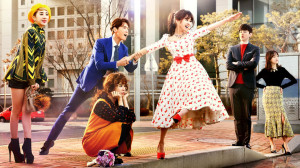 Lo: As for honorable mentions, I only have two to add: One More Happy Ending and Sotus: The Series. One More Happy Ending might have gotten hit by the worst case of Sudden Onset Melo Syndrome I have ever seen, but I still maintain that the first two episodes are the funniest thing I have ever seen, and I need to give it some props for that. The belt. The goldfish. The animal onsies. And, of course, Mi-mo’s “Abso-fucking-lutely!”.
Lo: As for honorable mentions, I only have two to add: One More Happy Ending and Sotus: The Series. One More Happy Ending might have gotten hit by the worst case of Sudden Onset Melo Syndrome I have ever seen, but I still maintain that the first two episodes are the funniest thing I have ever seen, and I need to give it some props for that. The belt. The goldfish. The animal onsies. And, of course, Mi-mo’s “Abso-fucking-lutely!”.
Sotus is another “does this really qualify” entry, but once again, my list and I want to spread the word, as Sotus is still airing. It’s a Thai — hence the questioning — series about a freshmen engineering student who gets hazed under the titular SOTUS system, and ends up falling for his head hazer. Their relationship is spiteful and tender, all at once and up to 11. THIS is how to write enemies-turned-lovers, people. Seriously, if it had been a K-drama, Sotus would probably be number 1. I think that covers all the bases… Oh! Last thing: both leads are guys.
2016 was indeed a great year for dramas, at least, more serious ones. My big hope for 2017 is that the quality that’s been all over melos and socio-politcal dramas starts to bleed into rom-coms and comedies.
(Images via: JTBC, KBS, MBC, OCN, tvN, Viki)


